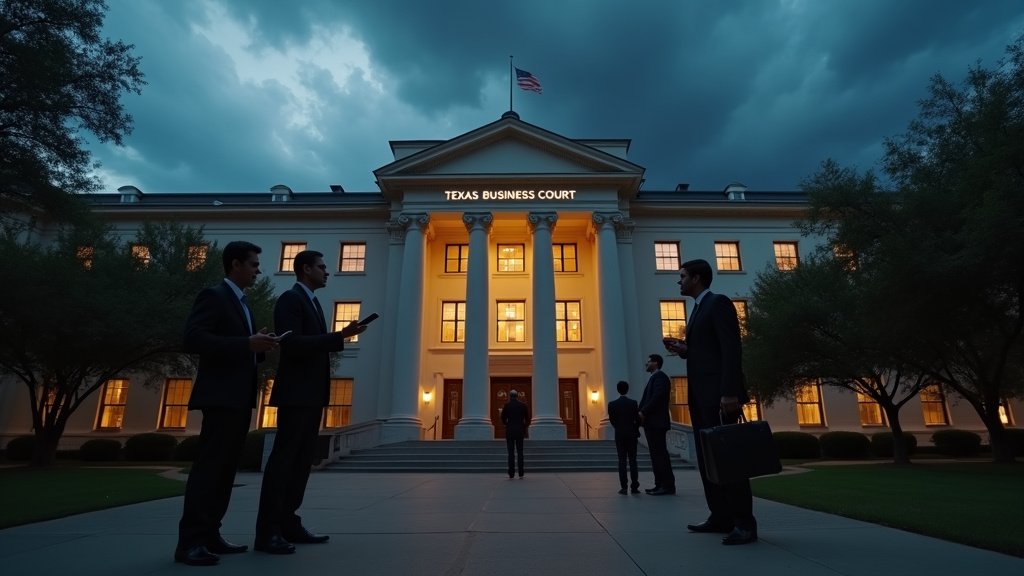Texas Unveils Specialized Business Court, Signaling Major Shift for Energy Sector Litigation
Austin, Texas – September 1, 2024, marked a significant evolution in Texas’s legal landscape with the official launch of the Texas Business Court. This new, specialized judicial system, established by House Bill 19, is designed to handle complex commercial disputes, offering a streamlined and focused venue that holds particular promise for the state’s dominant energy sector. The court’s broad jurisdiction and its ambitious aim to compete with established legal hubs like Delaware position it as a top trending development in corporate law.
The Genesis of a Specialized Forum
The creation of the Texas Business Court stems from a legislative effort to address the growing need for specialized courts capable of efficiently managing high-stakes business litigation. Prior to its establishment, Texas district courts often juggled complex commercial cases alongside criminal and family law matters, leading to crowded dockets and potential delays. By providing a dedicated forum, lawmakers sought to expedite the resolution of significant business disputes, foster a more predictable body of Texas business law through written opinions, and ultimately enhance the state’s attractiveness for corporate operations and legal resolution.
Jurisdiction and Scope: A Broad Reach for Business Disputes
The Texas Business Court operates with jurisdiction concurrent to state district courts but is specifically empowered to hear certain categories of complex commercial cases. Initially, its scope included actions with at least $5 million in controversy related to corporate governance, derivative proceedings, fiduciary duties, and matters arising from the Texas Business Organizations Code. Jurisdiction also extends to cases involving publicly traded companies, irrespective of the amount in controversy, provided the subject matter aligns with the court’s purview. While initially demanding a $10 million threshold for certain commercial transactions, recent legislative amendments, including HB 40 in June 2025, have lowered this to $5 million for many cases and expanded jurisdiction to encompass certain intellectual property claims and arbitration-related proceedings. However, the court explicitly excludes matters such as medical malpractice, personal injury, and consumer transactions.
Specialization, Efficiency, and the Development of Law
At the heart of the Texas Business Court’s design are its specialized judges and focused dockets. Appointed by the Governor with Senate confirmation, these judges are required to possess extensive experience in complex civil business litigation or business transaction law. This specialization aims to bring a higher level of expertise to intricate commercial disputes. Unlike the jury-free Delaware Court of Chancery, Texas’s Business Court preserves the right to a jury trial, a notable feature that could appeal to a broader range of litigants. Furthermore, the court’s mandate to issue written opinions is crucial for building a consistent and predictable body of Texas jurisprudence, offering clarity for businesses and legal professionals.
The Energy Sector’s New Arena
For Texas, a state deeply intertwined with the energy industry, the Business Court’s establishment is particularly significant news. The oil and gas sector, with its high-value contracts, complex corporate structures, and intricate regulatory environments, frequently generates litigation that benefits from specialized handling. The Business Court offers a venue to streamline these complex energy cases, potentially reducing resolution times and providing a more uniform approach than the traditional county-by-county system.
Energy companies can now turn to a forum designed to understand the nuances of their high-stakes commercial disputes, from contract disagreements to corporate governance challenges. While the monetary thresholds might initially exclude some smaller disputes, parties can agree to bring cases within the court’s purview. The appellate process, handled by the new Fifteenth Court of Appeals, also adds a layer of specialized review relevant to energy sector regulations. Some legal experts note that while the court system is new, it provides an attractive middle ground between the perceived unpredictability of state trial courts and the finality of commercial arbitration.
Texas vs. Delaware: A Legal Showdown for Corporate Dominance
The creation of the Texas Business Court is a clear strategic move by Texas to challenge Delaware’s long-standing dominance as the nation’s premier jurisdiction for corporate law and incorporations. Texas, already boasting a pro-business climate with no state income tax, now offers a specialized judicial forum to rival Delaware’s famed Court of Chancery. This competition has already seen some high-profile companies consider or make moves from Delaware to Texas, a trend some are calling a “DExit.”
However, Texas faces the challenge of building a robust body of precedent, a domain where Delaware has centuries of accumulated case law. While Texas’s judicial terms are shorter than Delaware’s, potentially raising questions about continuity and judicial independence, the specialized nature of the Texas court and its broader jurisdictional reach beyond internal corporate governance could prove attractive. The availability of jury trials in Texas also presents a different dynamic compared to Delaware’s bench-focused system.
Navigating Challenges and Future Outlook
Despite its promising start, the Texas Business Court system is not without its complexities. The initial rollout involved only five of the eleven planned divisions, with the remainder contingent on legislative authorization and funding. This geographic limitation means that major energy hubs like the Permian Basin may not have immediate local access to the court, requiring parties to agree on venue. Filing fees are also higher than in traditional district courts. Furthermore, as the court establishes its jurisprudence, questions regarding jurisdiction, the precise calculation of amounts in controversy, and the potential for constitutional challenges will continue to be addressed.
Nonetheless, the establishment of the Texas Business Court represents a significant advancement for the state’s legal infrastructure. It signals a commitment to providing efficient, specialized resolution for complex commercial disputes, with particular implications for the state’s vital energy sector. As Texas continues to refine this new judicial tool, it solidifies its position as a growing contender in the national arena for corporate law and business litigation.






